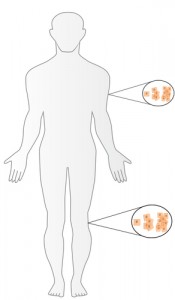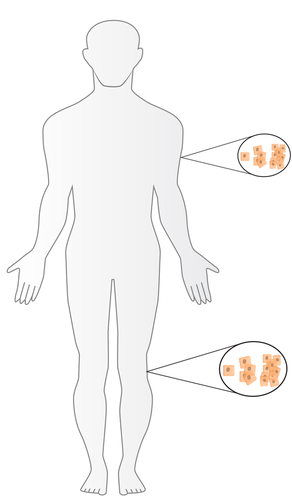 In a study entitled “Macrophage migration inhibitory factor engages PI3K/Akt signaling and is a prognostic factor in metastatic melanoma” published in the BMC Cancer journal, a group of researchers set out to understand the clinical significance of high macrophage migration inhibitory factor (MIF) expression in melanoma.
In a study entitled “Macrophage migration inhibitory factor engages PI3K/Akt signaling and is a prognostic factor in metastatic melanoma” published in the BMC Cancer journal, a group of researchers set out to understand the clinical significance of high macrophage migration inhibitory factor (MIF) expression in melanoma.
MIF is a cytokine released by immune cells and is responsible for several cellular processes, such as cell cycle regulation and the control of proliferation.
Different studies have shown that overexpression of MIF can be found in a variety of cancers, including melanocytic tumors, with the highest expression levels occurring in malignant melanoma.
Using small interference siRNA, the researchers knocked down MIF expression in human melanoma cell lines in vitro, analyzing proliferation, cell cycle, apoptosis (cell death), clonogenicity, and Akt signaling effects of MIF depletion.
The results demonstrated that absence of MIF in these cells lines, significantly reduced proliferation, increased apoptosis, and decreased anchorage-independent growth, a signature feature of tumors with metastatic potential.
These effects were further associated with reduced numbers of cells entering the S phase (when DNA replication occurs) of cell cycle, decreased cyclin D1 and CDK4 expression (proteins involved in cell proliferation), increased p27 expression and decreased Akt phosphorylation.
Additionally, the team preformed in silico analyses of expression microarray data, to correlate MIF expression levels in melanoma tumors with overall patient survival.
The results revealed that MIF expression levels in primary melanoma were not associated with outcome, while higher levels of MIF in metastatic lesions were significantly associated with faster disease progression.
These data suggest that, in melanoma, MIF functions upstream of the PI3K/Akt pathway, one of the most important signaling networks in cancer, and its inhibition significantly impacts on the capacity of these tumor cells to divide and establish metastatic potential.
Furthermore, high MIF levels in metastatic melanoma are associated with faster disease recurrence, highlighting the clinical relevance of MIF signaling in this malignancy and providing strong evidence for both targeting and monitoring MIF expression in clinical melanoma.


